小学一般过去式句型转换1
一般过去时句型转换(最新整理)

一般过去时句型转换: 表示过去发生的事情。
is , am→was ;are →were ;do →did ;go→went ;sing →sang;come→came ;have→had1.I was born on February 27th, 1999. 否定句:一般疑问句:特殊疑问句:2.He was born in Bai Lingmiao. 否定句:一般疑问句:特殊疑问句:3.It was rainy yesterday. 否定句:一般疑问句:特殊疑问句:反义疑问句:选择疑问句:(windy)4. These were their books. 否定句:一般疑问句:特殊疑问句:5.I did my homework yesterday. 否定句:一般疑问句:特殊疑问句:6. He went to the park last week. 否定句:一般疑问句:特殊疑问句:反义疑问句:选择疑问句:(the shop)7. She sang some English songs at home last night.否定句:一般疑问句:特殊疑问句:8.Linda went to school on foot yesterday morning.否定句:一般疑问句:特殊疑问句:反义疑问句:选择疑问句:(by bike)9.They lived in a big house 10 years ago. 否定句:一般疑问句:特殊疑问句:10.The twins liked swimming last year. 否定句:一般疑问句:特殊疑问句:反义疑问句:选择疑问句:(running)11.There used to be lots of flowers in the garden years ago.否定句:一般疑问句:特殊疑问句:“”“”At the end, Xiao Bian gives you a passage. Minand once said, "people who learn to learn are very happy people.". In every wonderful life, learning is an eternal theme. As a professional clerical and teaching position, I understand the importance of continuous learning, "life is diligent, nothing can be gained", only continuous learning can achieve better self. Only by constantly learning and mastering the latest relevant knowledge, can employees from all walks of life keep up with the pace of enterprise development and innovate to meet the needs of the market. This document is also edited by my studio professionals, there may be errors in the document, if there are errors, please correct, thank you!。
(word完整版)小学六年级一般过去时练习题及答案
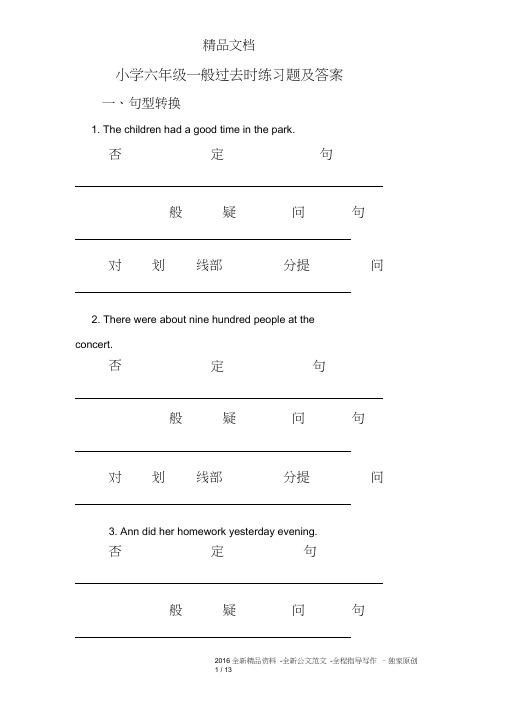
jeθX
jseη- <zeuιq□ OJnoXuθq∕√∖- Z
MOU JSnf noX」Oj IIeo OllOIIdo冋eaιoι∣丄-g
XepjθtsθX ψo∕v∖θs noι∣」θqjouu X∣∕∖∣g
jbθXJSeI eseuiqo ILleOl OJUJOIP
ει/9
■ 6uιueθ∣□ UJe o ueθ∣□ gpeueep V XePUnS
ISel
UJOOJ
XUJ
CP!P
OSooP a OP∀ePuθ>∣θθmISel OP科!∣∕∖∣疋Ψ∖ΛZ
6uiujoluXepjθjsθX OSOuJnOuJOS日Mo」」oluoiV
sjθmo∣)θq;pθjθjbmOlIS ' L
XepjθjsθX ψθMθsnoq
I-<i Xepι∣oq」no人UO oB noXθJθq∕√∖-,
t≡⅜≡≡ Al
哥!”tωeMStoιtθqιtpuetθqtθ>∣e∣i0}u∖
tθqitpθdωnf
o”!qtetψedtXqtoV∏uθM-
JSeltpuθ>∣θθMtΛitpiptuqo∏tIPlE ∕w
8
.He wait for you
three
hours
ago.
9
.Who find
it
just
now?
II.
翻
译下列句子
1.我过了一个忙碌但却刺激的周末
精品文档
but exciting weekend.
2.上周六他们做什么了?他们做作业和购物了。
一般过去时态句型转换方法归纳
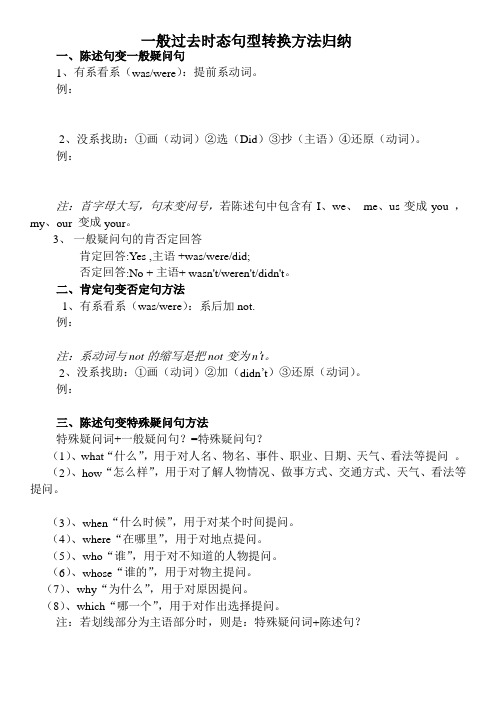
一般过去时态句型转换方法归纳
一、陈述句变一般疑问句
1、有系看系(was/were):提前系动词。
例:
2、没系找助:①画(动词)②选(Did)③抄(主语)④还原(动词)。
例:
注:首字母大写,句末变问号,若陈述句中包含有I、we、me、us变成you ,my、our 变成your。
3、一般疑问句的肯否定回答
肯定回答:Yes ,主语 +was/were/did;
否定回答:No + 主语+ wasn't/weren't/didn't。
二、肯定句变否定句方法
1、有系看系(was/were):系后加not.
例:
注:系动词与not的缩写是把not变为n’t。
2、没系找助:①画(动词)②加(didn’t)③还原(动词)。
例:
三、陈述句变特殊疑问句方法
特殊疑问词+一般疑问句?=特殊疑问句?
(1)、what“什么”,用于对人名、物名、事件、职业、日期、天气、看法等提问。
(2)、how“怎么样”,用于对了解人物情况、做事方式、交通方式、天气、看法等提问。
(3)、when“什么时候”,用于对某个时间提问。
(4)、where“在哪里”,用于对地点提问。
(5)、who“谁”,用于对不知道的人物提问。
(6)、whose“谁的”,用于对物主提问。
(7)、why“为什么”,用于对原因提问。
(8)、which“哪一个”,用于对作出选择提问。
注:若划线部分为主语部分时,则是:特殊疑问词+陈述句?。
小学生如何准确使用一般过去时

小学生如何准确使用一般过去时
一般过去时是英语语法中的一个基本时态,用于表示过去发生的动作、事件或状态,也是英语考试常考的内容之一。
那么小学生如何准确使用一般过去时呢?以下是几点建议。
了解动词过去式
使用一般过去时需要用到动词的过去式,因此小学生需要首先掌握常见动词的过去式。
例如:
- play → played
- eat → ate
- watch → watched
- study → studied
- dance → danced
当然还有不规则动词的过去式,例如:
- be → was/were
- have → had
- go → went
- do → did
- see → saw
小学生可以通过课本、练册等工具研究和记忆这些动词的过去式。
切换思维方式
使用一般过去时需要将思维模式从现在转变为过去。
小学生可以通过以下方式帮助自己切换思维:
- 听老师或其他同学用过去时叙述一些事件或故事
- 阅读课外书籍并用过去时复述故事情节
- 练默写过去时的句子和短文
这样可以帮助小学生熟悉和适应使用一般过去时。
多练
练是掌握任何技能的关键,小学生需要通过大量阅读和写作练来巩固和加深对一般过去时的理解和掌握。
建议小学生可以完成以下练:
- 阅读一些简单的故事或文章,并用过去时复述
- 完成练册中的一般过去时练题
- 写一篇自己的日记,使用一般过去时叙述过去发生的事情
以上是几点帮助小学生准确使用一般过去时的建议。
希望对小学生们的英语学习有所帮助!。
六年级英语一般过去时讲解与练习

六年级(Ji)英语一般过去时讲解与练习1.一般过去时表示过去某个时间发生的动作或存在的状态,常和表示过去的时间状语连用。
一般过去时也表示过去经常或反(Fan)复发生的动作。
2.Be动词在一般过去时(Shi)中的变化:⑴am 和is在一般(Ban)过去时中变为was。
(was not=wasn’t)⑵are在一般过(Guo)去时中变为were。
(were not=weren’t)⑶带有was或were的句(Ju)子,其否定、疑问的变化和is, am, are一样(Yang),即否定句在was或were后加not,一般疑问句把was或were调到句首。
3.句中没(Mei)有be动词的一般过去时的句子否定句:didn’t +动词原形,如:Jim didn’t go home yesterday. 一般疑问句:在句首加did,句子中的动词过去式变回原形。
如:Did Jim go home yesterday?特殊疑问句:⑴疑问词+did+主语+动词原形?如:What did Jim do yesterday? ⑵疑问词当主语时:疑问词+动词过去式?如:Who went to home yesterday? 动词过去式变化规则:1.一般在动词末尾加-ed,如:play-played, cook-cooked2.结尾是e加d,如:taste-tasted3.末尾只有一个元音字母和一个辅音字母的重读闭音节,应双写末尾的辅音字母,再加-ed,如:stop-stopped4.以“辅音字母+y”结尾的,变y为i,再加-ed,如:study-studied 5.小学常用不规则动词过去式:am,is-was, are-were, do-did, see-saw, say-said, give-gave, get-got, go-went, have-had, eat-ate, take-took, run-ran, sing-sang, put-put, make-made, read-read, write-wrote, draw-drew, drink-drank, fly-flew, ride-rode, speak-spoke, sweep-swept, swim-swam, sit-sat一.用be动词的适当形式填空1. We __________ students five years ago.2. Patti and I __________ good friends.3. Today __________ Tuesday, Yesterday __________ Monday.4. Sue __________ on the slide a moment ago.5. Where is my hat? It _______ on the desk just now.二.单项选择:从下列各题后所给的四个选项中选择最佳答案填空。
小升初语法专项-一般过去时(通用版,含答案)
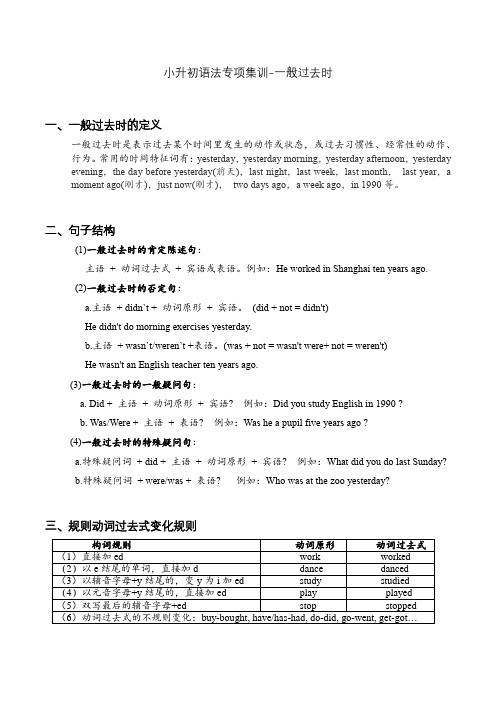
小升初语法专项集训-一般过去时一、一般过去时的定义一般过去时是表示过去某个时间里发生的动作或状态,或过去习惯性、经常性的动作、行为。
常用的时间特征词有:yesterday,yesterday morning,yesterday afternoon,yesterday evening,the day before yesterday(前天),last night,last week,last month,last year,a moment ago(刚才),just now(刚才),two days ago,a week ago,in 1990等。
二、句子结构(1)一般过去时的肯定陈述句:主语+ 动词过去式+ 宾语或表语。
例如:He worked in Shanghai ten years ago.(2)一般过去时的否定句:a.主语+ didn`t + 动词原形+ 宾语。
(did + not = didn't)He didn't do morning exercises yesterday.b.主语+ wasn`t/weren`t +表语。
(was + not = wasn't were+ not = weren't)He wasn't an English teacher ten years ago.(3)一般过去时的一般疑问句:a. Did + 主语+ 动词原形+ 宾语? 例如:Did you study English in 1990 ?b. Was/Were + 主语+ 表语? 例如:Was he a pupil five years ago ?(4)一般过去时的特殊疑问句:a.特殊疑问词+ did + 主语+ 动词原形+ 宾语? 例如:What did you do last Sunday?b.特殊疑问词+ were/was + 表语? 例如:Who was at the zoo yesterday?三、规则动词过去式变化规则一、写出下列单词的过去式。
一般过去时练习 句型转换
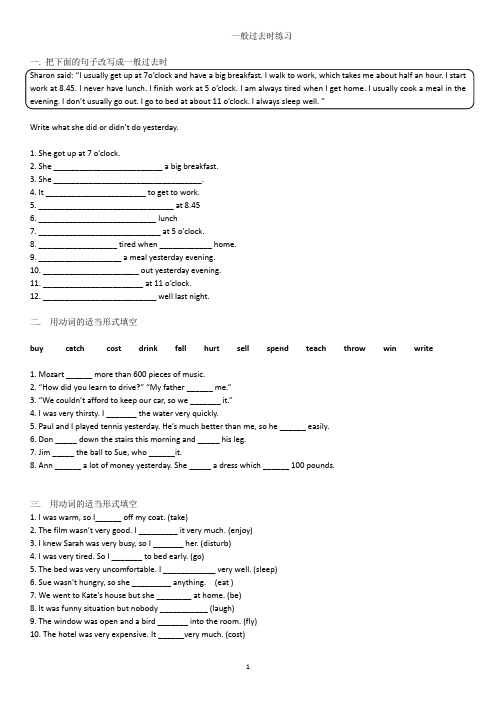
一般过去时练习一. 把下面的句子改写成一般过去时Sharon said: “I usually get up at 7o’clock and have a big breakfast. I walk to work, which takes me about half an hour. I start work at 8.45. I never have lunch. I finish work at 5 o’clock. I am always tired when I get home. I usually cook a meal in the evening. I don’t usually go out. I go to bed at about 11 o’clock. I always sleep well. ”Write what she did or didn’t do yesterday.1. She got up at 7 o’clock.2. She _________________________ a big breakfast.3. She __________________________________.4. It _______________________ to get to work.5. _______________________________ at 8.456. ___________________________ lunch7. ____________________________ at 5 o’clock.8. __________________ tired when ____________ home.9. ___________________ a meal yesterday evening.10. ______________________ out yesterday evening.11. _______________________ at 11 o’clock.12. __________________________ well last night.二. 用动词的适当形式填空buy catch cost drink fall hurt sell spend teach throw win write1. Mozart ______ more than 600 pieces of music.2. “How did you learn to drive?”“My father ______ me.”3. “We couldn’t afford to keep our car, so we _______ it.”4. I was very thirsty. I _______ the water very quickly.5. Paul and I played tennis yesterday. He’s much better than me, so he ______ easily.6. Don _____ down the stairs this morning and _____ his leg.7. Jim _____ the ball to Sue, who ______it.8. Ann ______ a lot of money yesterday. She _____ a dress which ______ 100 pounds.三. 用动词的适当形式填空1. I was warm, so I______ off my coat. (take)2. The film was n’t very good. I _________ it very much. (enjoy)3. I knew Sarah was very busy, so I _______ her. (disturb)4. I was very tired. So I _______ to bed early. (go)5. The bed was very uncomfortable. I ____________ very well. (sleep)6. Sue wasn’t hungry, so she _________ anything. (eat )7. We went to Kate’s house but she ________ at home. (be)8. It was funny situation but nobody ___________ (laugh)9. The window was open and a bird _______ into the room. (fly)10. The hotel was very expensive. It ______very much. (cost)四. 你刚度假回来,别人问了很多关于你的假期的问题。
一般过去时句型转换专练
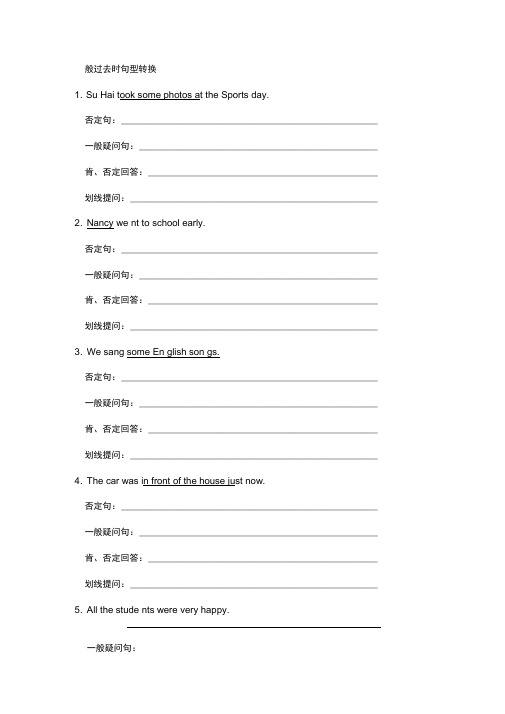
般过去时句型转换1. Su Hai took some photos at the Sports day.否定句:_________________________________________________________ 一般疑问句:_____________________________________________________ 肯、否定回答:___________________________________________________ 划线提问:_______________________________________________________ 2. Nancy we nt to school early.否定句:_________________________________________________________ 一般疑问句:_____________________________________________________ 肯、否定回答:___________________________________________________ 划线提问:_______________________________________________________ 3. We sang some En glish son gs.否定句:_________________________________________________________ 一般疑问句:_____________________________________________________ 肯、否定回答:___________________________________________________ 划线提问:_______________________________________________________ 4. The car was in front of the house just now.否定句:_________________________________________________________ 一般疑问句:_____________________________________________________ 肯、否定回答:___________________________________________________ 划线提问:_______________________________________________________ 5. All the stude nts were very happy.否定句:_________________________________________________________ 肯、否定回答: __________________________________________________ 6. They were in his pocket.否定句: ________________________________________________________ 一般疑问句: ____________________________________________________ 肯、否定回答: __________________________________________________ 划线提问: ______________________________________________________ 7. They played football in the playground.否定句: ________________________________________________________ 一般疑问句: ____________________________________________________ 肯、否定回答: __________________________________________________ 划线提问: ______________________________________________________ 8. He went out ten minu tes ago.否定句: ________________________________________________________ 一般疑问句: ____________________________________________________ 肯、否定回答: __________________________________________________ 划线提问: ______________________________________________________ 9. I bought a VCD last month.否定句: ________________________________________________________ 一般疑问句: ____________________________________________________ 肯、否定回答: __________________________________________________ 划线提问: ______________________________________________________10. The childre n had a good time in the park.否定句: ________________________________________________________划线提问: ______________________________________________________ 11. Ann did her homework yesterday eve ning.否定句: ________________________________________________________ 一般疑问句: ____________________________________________________ 肯、否定回答: __________________________________________________ 划线提问: ______________________________________________________ 12. Last week I read an En qlish book.否定句: ________________________________________________________ 一般疑问句: ____________________________________________________ 肯、否定回答: __________________________________________________ 划线提问: ______________________________________________________ 13. My brother was in the zoo just now.否定句: ________________________________________________________ 一般疑问句: ____________________________________________________ 肯、否定回答: __________________________________________________ 划线提问: ______________________________________________________ 14.She had some bread for lunch today.否定句: ________________________________________________________ 一般疑问句: ____________________________________________________ 肯、否定回答: __________________________________________________ 划线提问: ______________________________________________________ 15. There were some flowers in the garde n.肯、否定回答: __________________________________________________ 16. She could finish her homework by herself.否定句: ________________________________________________________ 一般疑问句: ____________________________________________________ 肯、否定回答: __________________________________________________ 17. They were good frie nd .否定句: ________________________________________________________ 一般疑问句: ____________________________________________________ 肯、否定回答: __________________________________________________ 划线提问: ______________________________________________________ 18. We saw a film with our teacher.否定句: ________________________________________________________ 一般疑问句: ____________________________________________________ 肯、否定回答: __________________________________________________ 划线提问: ______________________________________________________ 19. We listened to music the whole night .否定句: ________________________________________________________ 一般疑问句: ____________________________________________________ 肯、否定回答: __________________________________________________ 划线提问: ______________________________________________________ 20. She arrived there at 9:00 that day .否定句: ________________________________________________________。
小学一般过去式句型转换1
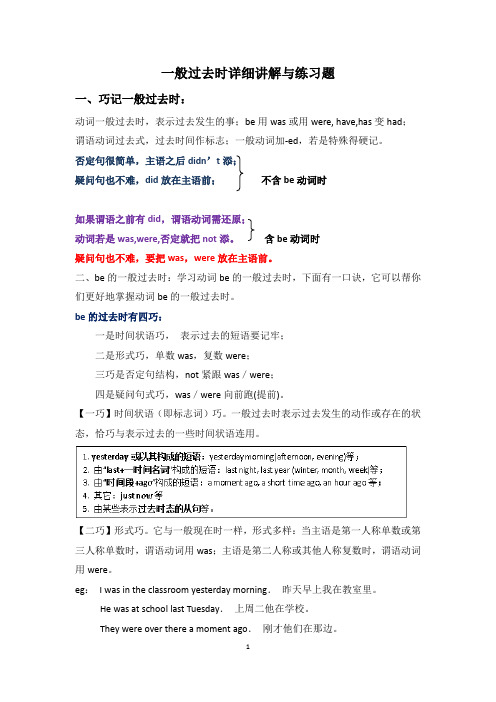
一般过去时详细讲解与练习题一、巧记一般过去时:动词一般过去时,表示过去发生的事;be用was或用were, have,has变had;谓语动词过去式,过去时间作标志;一般动词加-ed,若是特殊得硬记。
否定句很简单,主语之后didn’t添;疑问句也不难,did放在主语前;不含be动词时如果谓语之前有did,谓语动词需还原;动词若是was,were,否定就把not添。
含be动词时疑问句也不难,要把was,were放在主语前。
二、be的一般过去时:学习动词be的一般过去时,下面有一口诀,它可以帮你们更好地掌握动词be的一般过去时。
be的过去时有四巧:一是时间状语巧,表示过去的短语要记牢;二是形式巧,单数was,复数were;三巧是否定句结构,not紧跟was/were;四是疑问句式巧,was/were向前跑(提前)。
【一巧】时间状语(即标志词)巧。
一般过去时表示过去发生的动作或存在的状态,恰巧与表示过去的一些时间状语连用。
【二巧】形式巧。
它与一般现在时一样,形式多样:当主语是第一人称单数或第三人称单数时,谓语动词用was;主语是第二人称或其他人称复数时,谓语动词用were。
eg:I was in the classroom yesterday morning.昨天早上我在教室里。
He was at school last Tuesday.上周二他在学校。
They were over there a moment ago.刚才他们在那边。
【三巧】否定句结构巧。
与动词be的一般现在时一样,它在动词后面加not即可变成否定句,并且was, were与not可以缩写成wasn't, weren't。
即:主语+wasn't/weren't +表语+其他。
例如:I was not (=wasn't) here yesterday.昨天我不在这儿。
My parents were not (=weren't) at home last Sunday.上周日我父母不在家。
小学英语一般过去时专项讲解、练习和参考答案

小学英语一般过去时专项讲解、练习和参考答案一般过去时专项讲解与练习一、概念:一般过去时表示过去某一时候发生的动作或存在的状态。
常与一般过去时连用的时间状语有:yesterday; 昨天just now刚才the day before yesterday;前天⋯⋯ago ⋯⋯之前(例如:三天前 three days ago )Last ⋯⋯上一个⋯(例如:上周星期天last Sunday )in 1990在1990年(in+过去时间)二、分类(一) be 动词的一般过去时:肯定句:主语 +be 动词的一般过去时( was/were)否定句:主语+be动词的一般过去时(was/were)+not一般疑问句: be 动词的一般过去时( was/were )+主语(二) there be结构的一般过去时与be 动词的一般过去时的变化基本一致。
(三)一般动词的过去时:肯定句:主语 +动词的过去时( I laughed.)否定句:主语 +did not+ 动词原形( I didn’t laugh.)一般疑问句: Did+主语 +动词原形( Did you laugh?)三.巧记 chant动词一般过去时,表示过去发生事;be 用 was 或用 were, have,has变had;谓语动词过去式,过去时间坐标志;一般动词加 -ed ,若是特殊得硬记。
否定句很简单,主语之后didn ’ t 添;疑问句也不难, did 放在主语前;如果谓语之前有 did ,谓语动词需还原;动词若是 was,were, 否定就把 not 添。
四、习题练习(一)用动词的适当形式填空:1.He ______ (work) in that bank four years ago.2.She ______ (live) in the US last Monday.3.I ______ (see) him yesterday.4.He _______(come) to school at 6 o’clock this morning.5.The boy _______ (have) a bad cold yesterday.6.When _______ you _______ (buy) that house?7.He _______(tell) a story to his daughter yesterday.8._____ you ____ (try) to call me last night?9.What _______you _______ (buy) in the shop?I ______ (buy) a coat just now.10. The doctor ______ (get) up late this morning.11.She ________ (paint) the wall last month.12.My mother _______ (be) a worker 20 years ago.13.________ (be) you here just now?No, I ________ (be not) here.14.Why _______ your brother _______ (cry) last night?15.It ______(be) my mother’s birthday yesterday.(二)翻译下列句子:1.我上周去看爷爷和奶奶了。
外研版小学英语 一般过去时讲解

专注:心无旁骛,万事可破一般过去时一、结构:①be动词(is, am, are)→was/were 主语+ 谓语②实义动词→相应的动词过去式含义:①表示过去的事实或状态。
例:He was very busy an hour ago. 他在过去的一小时非常忙碌。
I was eight years old last year. 我去年8岁。
②表示在过去某个时间内所作的事情,常和表示过去的时间状语连用。
例:She bought many books yesterday. 昨天她买了很多书。
I played table tennis with my friend last Monday. 上周一我和一个朋友打了乒乓球。
表示过去的时间状语,有:yesterday, last week, last year, two days ago, ...二、动词的过去式动词有规则动词和不规则动词之分。
规则动词的过去式都是以-ed结尾,而不规则动词的过去式是没有规则。
1. 一般情况下,在动词原形后直接加ed。
如:wanted, played。
2. 以不发音的字母e结尾的动词,直接加d。
如:hoped, lived。
3. 重读闭音节单词需双写最后一个辅音字母,再加ed。
如:stopped, shipped。
4. 以辅音字母+y结尾的动词变y为i,再加ed。
如:studied,worried。
5. 有些动词不符合上面的规则,需要特殊记忆。
如:am(is)-was, are-were, go-went, eat-ate, swim-swam, buy-bought, see-saw, lose-lost teach-taught, bring-brought, think-thought, fall-fell, hurt-hurt, break-broke, win-won …1 / 1。
小学一般过去时
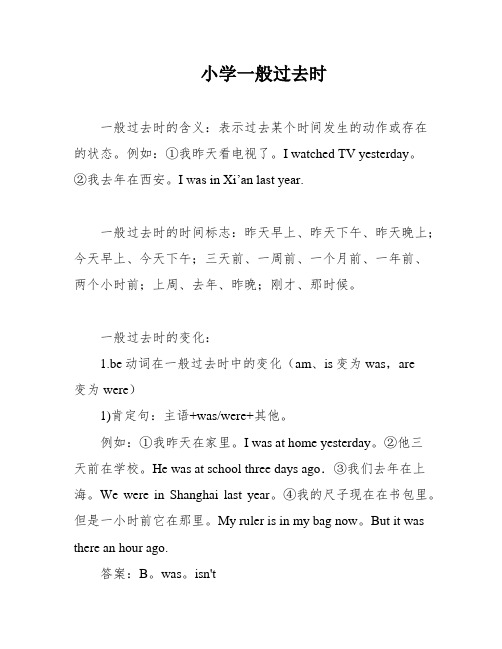
小学一般过去时一般过去时的含义:表示过去某个时间发生的动作或存在的状态。
例如:①我昨天看电视了。
I watched TV yesterday。
②我去年在西安。
I was in Xi’an last year.一般过去时的时间标志:昨天早上、昨天下午、昨天晚上;今天早上、今天下午;三天前、一周前、一个月前、一年前、两个小时前;上周、去年、昨晚;刚才、那时候。
一般过去时的变化:1.be动词在一般过去时中的变化(am、is变为was,are变为were)1)肯定句:主语+was/were+其他。
例如:①我昨天在家里。
I was at home yesterday。
②他三天前在学校。
He was at school three days ago.③我们去年在上海。
We were in Shanghai last year。
④我的尺子现在在书包里。
但是一小时前它在那里。
My ruler is in my bag now。
But it was there an hour ago.答案:B。
was。
isn't⑤我的笔十分钟前在桌子上。
但是现在它不在那里了。
My pen was on my desk ten minutes ago。
But it isn't there now.答案:A。
is。
wasn't2)否定句:主语+was/were+not+其他。
在was/were后加not,was not=wasn't;were not=weren't。
例如:①我昨天不在家里。
I wasn't at home yesterday。
②他三天前不在学校。
He wasn't at school three days ago.3.We were not in Shanghai last year。
(3) General ns: Did/ Were + subject + others。
小学英语一般过去时专项讲解、练习和参考答案
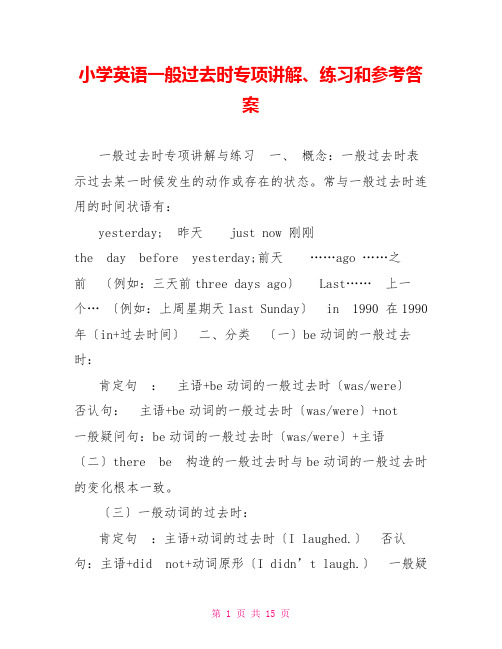
小学英语一般过去时专项讲解、练习和参考答案一般过去时专项讲解与练习一、概念:一般过去时表示过去某一时候发生的动作或存在的状态。
常与一般过去时连用的时间状语有:yesterday; 昨天 just now 刚刚the day before yesterday;前天……ago ……之前〔例如:三天前three days ago〕Last……上一个… 〔例如:上周星期天last Sunday〕 in 1990 在1990年〔in+过去时间〕二、分类〔一〕be动词的一般过去时:肯定句:主语+be动词的一般过去时〔was/were〕否认句:主语+be动词的一般过去时〔was/were〕+not 一般疑问句:be动词的一般过去时〔was/were〕+主语〔二〕there be 构造的一般过去时与be动词的一般过去时的变化根本一致。
〔三〕一般动词的过去时:肯定句:主语+动词的过去时〔I laughed.〕否认句:主语+did not+动词原形〔I didn’t laugh.〕一般疑问句:Did+主语+动词原形〔Did you laugh?〕三.巧记chant 动词一般过去时,表示过去发惹事;be用was或用were, have,has变had;谓语动词过去式,过去时间坐标志;一般动词加-ed,假设是特殊得硬记。
否认句很简单,主语之后didn’t添;疑问句也不难,did放在主语前;假如谓语之前有did,谓语动词需复原;动词假设是was,were,否认就把not添。
四、习题练习〔一〕用动词的适当形式填空:1. He ______(work) in that bank four years ago. 2.She ______ (live) in the US last Monday. 3.I ______ (see) him yesterday.4.He _______(e) to school at 6 o’clock this m orning.5. The boy _______(have) a bad cold yesterday. 6.When _______ you _______ (buy) that house? 7. He _______(tell) a story to his daughter yester day. 8. _____ you ____(try) to call me last night? 9.What _______you _______ (buy) in the shop? I ______ (buy) a coat just now. 10.The doctor ______ (get) up late this morning. 11. She ________ (paint) the wall last month. 12. My mother _______ (be) a worker 20 years ago.13. ________(be) you here just now? No, I ________(be not) here. 14.Why _______ your brother _______(cry) last night? 15. It______(be) my mother’s birthday yesterday. 〔二〕翻译以下句子:1.我上周去看爷爷和奶奶了。
小学英语一般过去时

英语一般过去时定义表示在的过去某个时间里所发生的动作或存在的状态。
构成一般过去时的句式变化1.陈述句:主语+动词过去式+其他I saw the rianbow yesterday.我昨天看到了彩虹。
They went to he park last Sunday.上周日他们去了公园。
Ben got up at six this morning.本今天早上是六点起床的。
2.一般疑问句1)将be动词提到句首陈述句:It was an egg yesterday.它昨天还是一个蛋。
一般疑问句:Was it an egg yesterday?它昨天还是一个蛋吗?陈述句:They were at school just now.他们刚才还在学校。
一般疑问句:Were they at school just now?他们刚才还在学校吗?Linda老师的小提醒主语是第一人称和第二人称的句子,其过去时变化时,要注意be动词的变化。
一般疑问句:Were you at home last night?你昨天晚上在家吗?肯定回答:Yes,I was.否定回答:No,I wasn't.2)用助动词did陈述句:I did my homework at school,我在学校做了作业。
一般疑问句:Did you do your homework at school?你在学校做作业了吗?陈述句:They played basketball just now.他们刚才打了篮球。
一般疑问句:Did they play basketball just now?他们刚才打篮球了吗?小提醒由过去时态的陈述句变一般疑问句时,变化技巧上可以用拆分法,将动词过去式拆分为did+动词原形,然后将did提到句首,这样就不容易发生错误。
He slept a whole day.他睡了一整天。
第一步:先将slept拆分为did sleep第二步:将did提到句首变成:Did he sleep a whole day?他睡了一整天吗?3.否定句1)在be动词后面+not陈述句:I was a teacher twenty years ago.我20年前是一名老师。
小学一般过去式句型转换
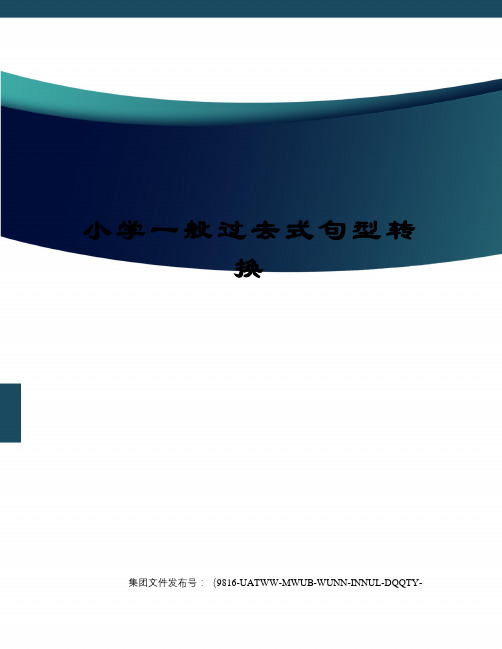
小学一般过去式句型转换集团文件发布号:(9816-UATWW-MWUB-WUNN-INNUL-DQQTY-一般过去时详细讲解与练习题一、巧记一般过去时:动词一般过去时,表示过去发生的事;be用was或用were, have,has变had;谓语动词过去式,过去时间作标志;一般动词加-ed,若是特殊得硬记。
否定句很简单,主语之后didn’t添;疑问句也不难,did放在主语前;不含be动词时如果谓语之前有did,谓语动词需还原;动词若是was,were,否定就把not添。
含be动词时疑问句也不难,要把was,were放在主语前。
二、be的一般过去时:学习动词be的一般过去时,下面有一口诀,它可以帮你们更好地掌握动词be的一般过去时。
be的过去时有四巧:一是时间状语巧,表示过去的短语要记牢;二是形式巧,单数was,复数were;三巧是否定句结构,not紧跟was/were;四是疑问句式巧,was/were向前跑(提前)。
【一巧】时间状语(即标志词)巧。
一般过去时表示过去发生的动作或存在的状态,恰巧与表示过去的一些时间状语连用。
【二巧】形式巧。
它与一般现在时一样,形式多样:当主语是第一人称单数或第三人称单数时,谓语动词用was;主语是第二人称或其他人称复数时,谓语动词用were。
eg: I was in the classroom yesterday morning.昨天早上我在教室里。
He was at school last Tuesday.上周二他在学校。
They were over there a moment ago.刚才他们在那边。
【三巧】否定句结构巧。
与动词be的一般现在时一样,它在动词后面加not即可变成否定句,并且was, were与not可以缩写成wasn't, weren't。
即:主语+ wasn't/ weren't +表语+其他。
例如:I was not (=wasn't) here yesterday.昨天我不在这儿。
小学一般过去式句型转换
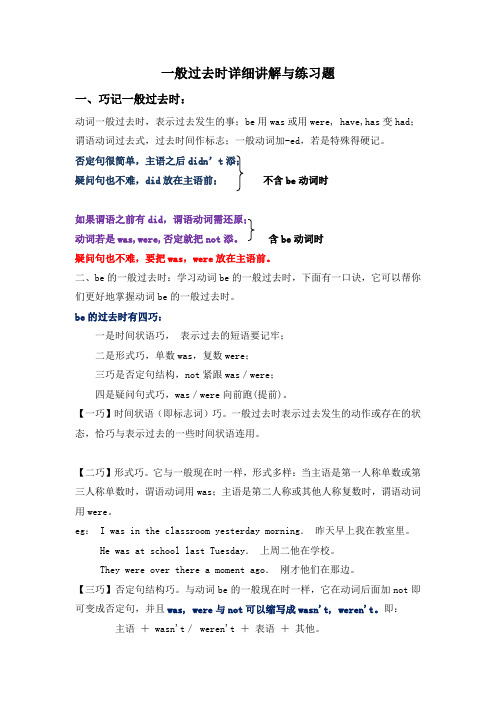
一般过去时详细讲解与练习题一、巧记一般过去时:动词一般过去时,表示过去发生的事;be用was或用were, have,has变had;谓语动词过去式,过去时间作标志;一般动词加-ed,若是特殊得硬记。
否定句很简单,主语之后didn’t添;疑问句也不难,did放在主语前;不含be动词时如果谓语之前有did,谓语动词需还原;动词若是was,were,否定就把not添。
含be动词时疑问句也不难,要把was,were放在主语前。
二、be的一般过去时:学习动词be的一般过去时,下面有一口诀,它可以帮你们更好地掌握动词be的一般过去时。
be的过去时有四巧:一是时间状语巧,表示过去的短语要记牢;二是形式巧,单数was,复数were;三巧是否定句结构,not紧跟was/were;四是疑问句式巧,was/were向前跑(提前)。
【一巧】时间状语(即标志词)巧。
一般过去时表示过去发生的动作或存在的状态,恰巧与表示过去的一些时间状语连用。
【二巧】形式巧。
它与一般现在时一样,形式多样:当主语是第一人称单数或第三人称单数时,谓语动词用was;主语是第二人称或其他人称复数时,谓语动词用were。
eg: I was in the classroom yesterday morning.昨天早上我在教室里。
He was at school last Tuesday.上周二他在学校。
They were over there a moment ago.刚才他们在那边。
【三巧】否定句结构巧。
与动词be的一般现在时一样,它在动词后面加not即可变成否定句,并且was, were与not可以缩写成wasn't, weren't。
即:主语+ wasn't/ weren't +表语+其他。
例如:I was not (=wasn't) here yesterday.昨天我不在这儿。
My parents were not (=weren't) at home last Sunday.上周日我父母不在家。
小学一般过去时练习题
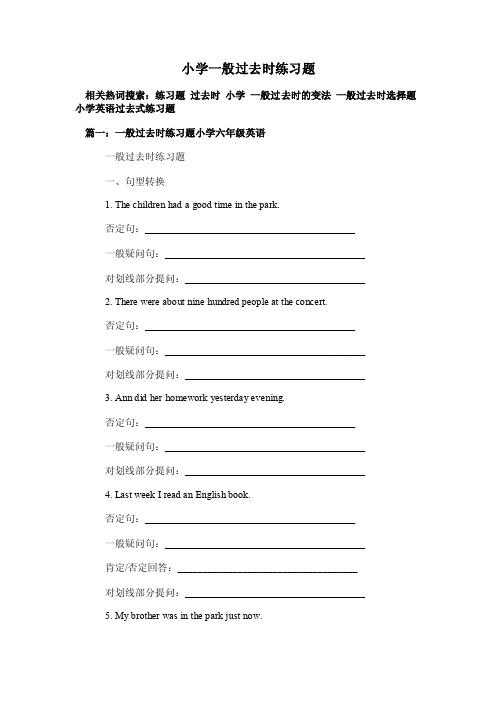
小学一般过去时练习题相关热词搜索:练习题过去时小学一般过去时的变法一般过去时选择题小学英语过去式练习题篇一:一般过去时练习题小学六年级英语一般过去时练习题一、句型转换1. The children had a good time in the park.否定句:__________________________________________一般疑问句:________________________________________对划线部分提问:____________________________________2. There were about nine hundred people at the concert.否定句:__________________________________________一般疑问句:________________________________________对划线部分提问:____________________________________3. Ann did her homework yesterday evening.否定句:__________________________________________一般疑问句:________________________________________对划线部分提问:____________________________________4. Last week I read an English book.否定句:__________________________________________一般疑问句:________________________________________肯定/否定回答:____________________________________对划线部分提问:____________________________________5. My brother was in the park just now.否定句:__________________________________________一般疑问句:________________________________________对划线部分提问:____________________________________二、写出下列动词的第三人称单数形式、过去式形式go _______ _______ enjoy _______ _______buy _______ _______ eat _______ _______get _______ _______ walk _______ _______take _______ _______ dance _______ _______write _______ _______ run _______ _______swim _______ _______ find _______ _______begin _______ _______ eat _______ _______play _______ _______ study _______ _______三、用所给词的适当形式填空。
小学英语一般过去时语法详解
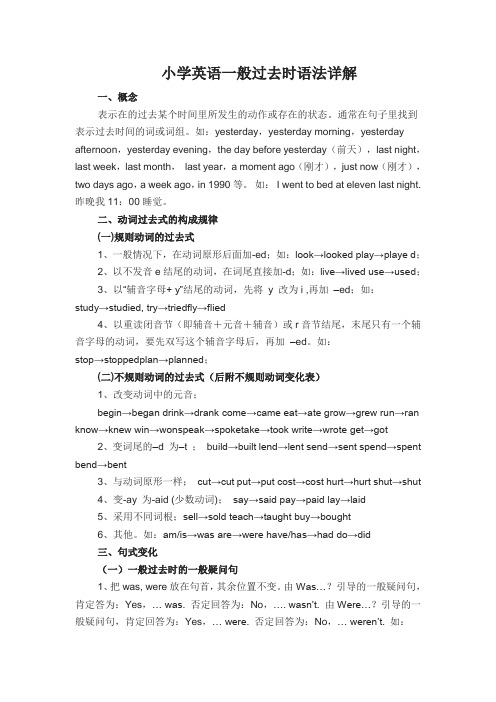
小学英语一般过去时语法详解一、概念表示在的过去某个时间里所发生的动作或存在的状态。
通常在句子里找到表示过去时间的词或词组。
如:yesterday,yesterday morning,yesterday afternoon,yesterday evening,the day before yesterday(前天),last night,last week,last month,last year,a moment ago(刚才),just now(刚才),two days ago,a week ago,in 1990等。
如:I went to bed at eleven last night.昨晚我11:00睡觉。
二、动词过去式的构成规律(一)规则动词的过去式1、一般情况下,在动词原形后面加-ed;如:look→looked play→playe d;2、以不发音e结尾的动词,在词尾直接加-d;如:live→lived use→used;3、以“辅音字母+ y”结尾的动词,先将y 改为i ,再加–ed;如:study→studied, try→triedfly→flied4、以重读闭音节(即辅音+元音+辅音)或r音节结尾,末尾只有一个辅音字母的动词,要先双写这个辅音字母后,再加–ed。
如:stop→stoppedplan→planned;(二)不规则动词的过去式(后附不规则动词变化表)1、改变动词中的元音;begin→began drink→drank come→came eat→ate grow→grew run→ran know→knew win→wonspeak→spoketake→took write→wrote get→got2、变词尾的–d 为–t ;bu ild→built lend→lent send→sent spend→spent bend→bent3、与动词原形一样;cut→cut put→put cost→cost hurt→hurt shut→shut4、变-ay 为-aid (少数动词);say→said pay→paid lay→laid5、采用不同词根;sell→sold teach→taught buy→bought6、其他。
- 1、下载文档前请自行甄别文档内容的完整性,平台不提供额外的编辑、内容补充、找答案等附加服务。
- 2、"仅部分预览"的文档,不可在线预览部分如存在完整性等问题,可反馈申请退款(可完整预览的文档不适用该条件!)。
- 3、如文档侵犯您的权益,请联系客服反馈,我们会尽快为您处理(人工客服工作时间:9:00-18:30)。
一般过去时详细讲解与练习题一、巧记一般过去时:动词一般过去时,表示过去发生的事;be用was或用were, have,has变had;谓语动词过去式,过去时间作标志;一般动词加-ed,若是特殊得硬记。
否定句很简单,主语之后didn’t添;疑问句也不难,did放在主语前;不含be动词时如果谓语之前有did,谓语动词需还原;动词若是was,were,否定就把not添。
含be动词时疑问句也不难,要把was,were放在主语前。
二、be的一般过去时:学习动词be的一般过去时,下面有一口诀,它可以帮你们更好地掌握动词be的一般过去时。
be的过去时有四巧:一是时间状语巧,表示过去的短语要记牢;二是形式巧,单数was,复数were;三巧是否定句结构,not紧跟was/were;四是疑问句式巧,was/were向前跑(提前)。
【一巧】时间状语(即标志词)巧。
一般过去时表示过去发生的动作或存在的状态,恰巧与表示过去的一些时间状语连用。
【二巧】形式巧。
它与一般现在时一样,形式多样:当主语是第一人称单数或第三人称单数时,谓语动词用was;主语是第二人称或其他人称复数时,谓语动词用were。
eg:I was in the classroom yesterday morning.昨天早上我在教室里。
He was at school last Tuesday.上周二他在学校。
They were over there a moment ago.刚才他们在那边。
【三巧】否定句结构巧。
与动词be的一般现在时一样,它在动词后面加not即可变成否定句,并且was, were与not可以缩写成wasn't, weren't。
即:主语+wasn't/weren't +表语+其他。
例如:I was not (=wasn't) here yesterday.昨天我不在这儿。
My parents were not (=weren't) at home last Sunday.上周日我父母不在家。
【四巧】疑问句式巧。
把was, were提到句首,句末用问号即可变为一般疑问句。
即:Was(Were) +主语+表语+其他这恰巧与动词be的一般现在时的疑问句式相似。
例如:Were you at home the day before yesterday﹖前天你在家吗Was she late this morning﹖今天早上她迟到了吗更巧的是疑问句的答语也相似,肯定回答用“Yes, 主语+was/were.”;否定回答用“No,主语+wasn't/weren't.”。
eg:—Were Wei Hua and Han Mei here just now﹖刚才魏华和韩梅在这儿吗—Yes, they were.(No, they weren't.) 是的,她们在。
(不,她们不在。
)动词过去式变化规则:1.一般在动词末尾加-ed,如:pull-pulled, cook-cooked2.结尾是e加d,如:taste-tasted3.末尾只有一个元音字母和一个辅音字母的重读闭音节,应双写末尾的辅音字母,再加-ed,如:stop-stopped4.以“辅音字母+y”结尾的,变y为i,再加-ed,如:study-studied5.不规则动词过去式:am,is-was are-were do-did see-saw say-said give-gave get-got go-went come-came have-had eat-ate take-took run-ran sing-sang put-put make-made read-read write-wrote draw-drew drink-drank fly-flew ride-rode speak-spoke sweep-swept swim-swam sit-sat一、句型转换1. The children had a good time in the park.否定句:__________________________________________ 一般疑问句:__________________________________________ 对划线部分提问:__________________________________________ 2. There were about nine hundred people at the concert.(音乐会)否定句:__________________________________________ 一般疑问句:__________________________________________ 对划线部分提问:__________________________________________ 3. Ann did her homework yesterday evening.否定句:__________________________________________ 一般疑问句:__________________________________________ 对划线部分提问:__________________________________________ 4. Last week I read an English book.否定句:__________________________________________ 一般疑问句:___________________________________________ 肯定/否定回答:__________________________________________ 对划线部分提问:__________________________________________ 5. My brother was in the park just now.否定句:__________________________________________ 一般疑问句:__________________________________________肯定/否定回答:___________________________________________ 对划线部分提问:____________________________________6. She had some bread for lunch yesterday.否定句:__________________________________________一般疑问句:________________________________________肯定/否定回答:____________________________________对划线部分提问:____________________________________*7. They read English last night.否定句:__________________________________________一般疑问句:________________________________________肯定/否定回答:____________________________________对划线部分提问:____________________________________8. I was born in 2007.否定句:_____________________________________________一般疑问句:_________________________________________对划线部分提问:_____________________________________二、写出下列动词的过去式Is_______ are ________have _________want _______hear________ Sit_______ watch _______play ______ enjoy _______do________ study ______dance _______like_______ live ________go ______ buy ______ eat______ get _______ walk ______take______put _______run______ come_______ become________ fly________swim_______ find _______ begin______三、请用正确动词形式填空。
1. I _________ (have) an exciting party last weekend.2. _________ she _________(practice) her guitar yesterdayNo, she _________.3. What ________ Tom ________ (do) on Saturday eveningHe ________(watch) TV and __________(read) an interesting book.4. They all _________(go) to the mountains yesterday morning.5. She _________(not visit) her aunt last weekend.She ________ (stay) at home and _________(do) some cleaning.6. When ________ you _________(write) this song I __________(write) it last year.7. My friend, Carol, ________(study) for the math test and ________(practice) English last night.8. ________ Mr. Li __________(do) the project on Monday morning Yes, he _________.9. How _________(be) Jim's weekend It _________(be not) bad.10. ________ (be) your mother a sales assistant last year No. she __________.四、改错题.1.How is Jane yesterday _____________________2.He go to school by bus last week. ____________________________3.He often goes home at 6:00 last month. _______________________ 4.I can fly kites seven years ago. ______________________________ 5.Did you saw him just now__________________________________ 6.Tom wasn’t watch TV last night. ______________________________ 7.I didn’t my homework yesterday. _____________________________ 8.He wait for you three hours ago. ______________________________。
